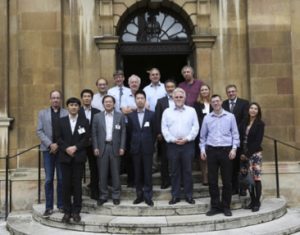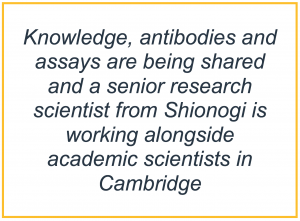Advancing disease understanding and drug discovery in infectious diseases
Collaboration between Shionogi and Department of Biochemistry, University of Cambridge

Since joining the Milner Therapeutics Consortium in 2016, Shionogi have developed a strong relationship with the Cambridge academic community working in infectious diseases, a significant area of focus for the company. Shionogi have been involved in a number of joint funding bids to the UK research councils and have provided resources to support projects themselves. For example, a project with Dr Martin Welch from the Department of Biochemistry is focussing on improving the therapeutic potential of antibody-mediated inhibition of Pseudomonas aeruginosa.
Pseudomonas aeruginosa is a pathogen which is found in many patients in hospital intensive care units who either die of- or with- infections caused by this organism. It is also frequently associated with chronic airway infections in cystic fibrosis patients. The mechanism of infection is through the Type III Secretion (T3S) system which is therefore a target for intervention to suppress virulence of the P. aeruginosa pathogen. The protein PcrV has been shown to be critical to virulence via the T3S system and antibodies against PcrV  improve survival in mouse respiratory infections. Humanised monoclonal antibodies against PcrV to treat humans exist but there are still many challenges to them reaching their full potential. There are usually a number of microbial species present in an infection in addition to P. aeruginosa and it is also possible that inhibition of the T3S system may inadvertently increase antimicrobial resistance. The aims of this project are to better understand i) the molecular mechanisms underpinning anti-PcrV antibody action, ii) how to quantify antibody action and iii) the wider consequences of inhibiting PcrV function on other cell processes. Knowledge, antibodies and assays are being shared between the two partners and a senior research scientist from Shionogi is working alongside academic scientists in the Welch lab to enable efficient transfer of knowledge and technical skills back in-house to Shionogi in Japan.
improve survival in mouse respiratory infections. Humanised monoclonal antibodies against PcrV to treat humans exist but there are still many challenges to them reaching their full potential. There are usually a number of microbial species present in an infection in addition to P. aeruginosa and it is also possible that inhibition of the T3S system may inadvertently increase antimicrobial resistance. The aims of this project are to better understand i) the molecular mechanisms underpinning anti-PcrV antibody action, ii) how to quantify antibody action and iii) the wider consequences of inhibiting PcrV function on other cell processes. Knowledge, antibodies and assays are being shared between the two partners and a senior research scientist from Shionogi is working alongside academic scientists in the Welch lab to enable efficient transfer of knowledge and technical skills back in-house to Shionogi in Japan.
Investigating how different sub-types of breast cancer respond to different treatments
Collaboration between AstraZeneca and Cancer Research UK Cambridge Institute, University of Cambridge
One of the first collaborative projects to be realised by the Consortium is a partnership between AstraZeneca and Professor Carlos Caldas at the University of Cambridge to investigate how different sub-types of breast cancer respond to different treatments. This research will help ensure that the most efficacious drugs are prescribed to individual patients.
Breast cancer consists of a number of different genomic sub-types which makes effective treatment challenging and prognosis variable. Some sub-types respond well to particular drugs or drug combinations whereas others are resistant. There is an urgent medical need to understand how and why particular sub-types respond differently to treatment. Professor Caldas has pioneered the development of a bio-bank of breast cancer patient-derived tumour cells and tissues (PDTC and PDTX) which have greater predictive power for clinical outcome than other preclinical models (e.g. cancer cell lines).
This project will enable AstraZeneca compounds and compound combinations to be tested in the human tumour models to detect and characterise the molecular mechanisms behind response and resistance to treatment in different breast cancer sub-types. The work will include analysis of pathway biomarkers, pathway ‘output’ measurements, analysis of apoptosis markers, gene expression profiling and analysis of potential feedback mechanisms, looking for potential resistance mechanisms.
Knowledge, compounds and equipment will be shared freely between the partners, connecting the expertise of the Caldas lab in ex vivo PDTC culture systems with compound information and state of the art robotics instrumentation in the AstraZeneca labs at the CRUK Cambridge Institute.
Investigating modulators of the ERK/MAPK pathway
Collaboration between Astex and the Babraham Institute
Another collaborative project started in 2015, is a partnership between Astex and Dr Simon Cook at the Babraham Institute to study modulators of the ERK/MAPK pathway. The aim of this collaboration is to investigate the significance of modulation of the ERK pathway in cell lines and the consequences for cancer cell growth inhibition and adaptive resistance. Targeting this pathway has been very successful in oncology therapy yet there remain many cancers that have an activated ERK pathway but do not respond to current BRAF or MEK inhibitors. The work will involve a detailed study of the ERK pathway and how it changes in response to different modes of inhibition. The aim is to understand better how ERK modulation affects cancer cell proliferation and apoptosis and how this may guide preclinical cancer research and drug discovery.
